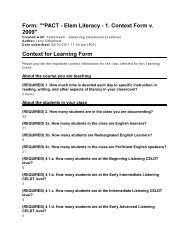The Tutoring Book - California State University, Sacramento
The Tutoring Book - California State University, Sacramento
The Tutoring Book - California State University, Sacramento
Create successful ePaper yourself
Turn your PDF publications into a flip-book with our unique Google optimized e-Paper software.
expectation of their disciplines more clearly through discussion. If we come to a session aware that there<br />
are other ways of thinking and knowing in various colleges around campus, then we can help students<br />
become more knowledgeable members of the academic writing community, as well as the language and<br />
knowledge community they wish to belong to, no matter what community that is.<br />
In her essay, “Collaboration, Control, and the Idea of a Writing Center,” Andrea Lunsford<br />
advocates for a writing center based in collaboration, specifically “collaboration that is attuned to<br />
diversity” (Lunsford 51). From her extensive research, Lunsford enumerates many benefits of<br />
collaborative learning, including enhanced problem solving skills, interdisciplinary thinking, and a<br />
“deeper understanding of others” (49). A collaborative view of the writing center such as this would<br />
capitalize on the benefits of a feminist approach for tutoring described above that “redefines subject<br />
mastery as seeking knowledge on personal terms and in concert with others” (McAndrew 7). Here, the<br />
question is not how do we overcome differences between tutors and tutees, but rather, how do we<br />
capitalize on them. Lunsford connects this benefit to the demands of the workplace by citing reports from<br />
the Labor Department indicating that to be successful in today’s workforce, students “will need to be able<br />
to work with others who are different from them and to learn to negotiate power and control” (52). <strong>The</strong><br />
idea that students need to learn to “negotiate power and control” is not new, and the question remains to<br />
be definitively answered if learning happens best in an environment that is teacher-led, student-led, or<br />
defined by power-sharing/decentered authority. Writing center advocates invariably come out on the side<br />
of a decentered authority. When tutors and tutees are both able to approach a tutoring session as learners<br />
and experts, who each have valuable knowledge to contribute to academic discussion, tutoring sessions<br />
can become a place where difference is not simply “dealt with,” but rather where it is what ignites the<br />
academic curiosity and discussion that is necessary for learning to occur.<br />
When tutoring takes place with discipline-specialized tutors, the equal exchange of differing<br />
questions and expertise is lost, for the ownership lays with the tutor, as that is where the knowledge<br />
resides. Tutors would clearly know more about the subject matter and the writing conventions than the<br />
tutee, leaving the tutor in the power position. In tutoring sessions with writing-specific tutors, on the<br />
other hand, knowledge resides in both parties and opportunities to generate new, shared knowledge<br />
emerge, a benefit expressly acknowledged by feminist theory. A writing-specific tutor can offer the kind<br />
of audience that asks the tutee to take authority over the subject she or he is addressing, for in most cases,<br />
the tutee will know more about their content, even if the tutor knows more about the writing process in<br />
general. Instead of offering another audience similar to the instructor, one who knows the content and<br />
conventions better than the student, the writing tutor can provide a much safer space that gives more room<br />
for the tutee to be the expert. This equalizes the subject positions between tutor and tutee, for they both<br />
possess a level of expertise and can therefore work collaboratively as learners. This can allow students to<br />
develop the “voice” feminist theory calls for because it respects the knowledge and worldview of the<br />
tutee, not just the expert tutor or instructor. According to Rebecca Moore Howard, in her essay<br />
“Collaborative Pedagogy,” “students can teach each other; more important, they can discover things that<br />
individually they might not” (59). Howard quotes Lunsford and Ede, who claim that “successful<br />
collaboration … allows not only for ‘group cohesion’ but also for ‘creative conflict’ and the protection of<br />
‘minority views’” (65). When generalized tutors place students as “responsible for their own learning”<br />
and expect them to contribute their own “life experience” in a meaningful way to the session, then<br />
collaboration can be successful because the tutor’s and the tutee’s views are both placed as the “minority<br />
view.” Neither viewpoint is privileged if both come as equals who have expertise in differing areas of<br />
study. <strong>The</strong>y can each contribute and thereby create new knowledge, not just reaffirm the knowledge<br />
supplied by instructors.<br />
Writing center tutoring is based on the idea that collaboration is an effective learning method.<br />
Ideally, collaborative learning decenters authority, reduces the stakes for writing, and fosters growth<br />
through an appreciation of differences. However, this appreciation of difference has not always been the<br />
focus of collaborative learning. According to Lunsford and Ede, “collaborative learning theory has from<br />
its inception failed to challenge traditional concepts of radical individualism and ownership of ideas and<br />
has operated primarily in a traditional and largely hierarchical way” (Howard 61). In her essay “Peer<br />
129

















